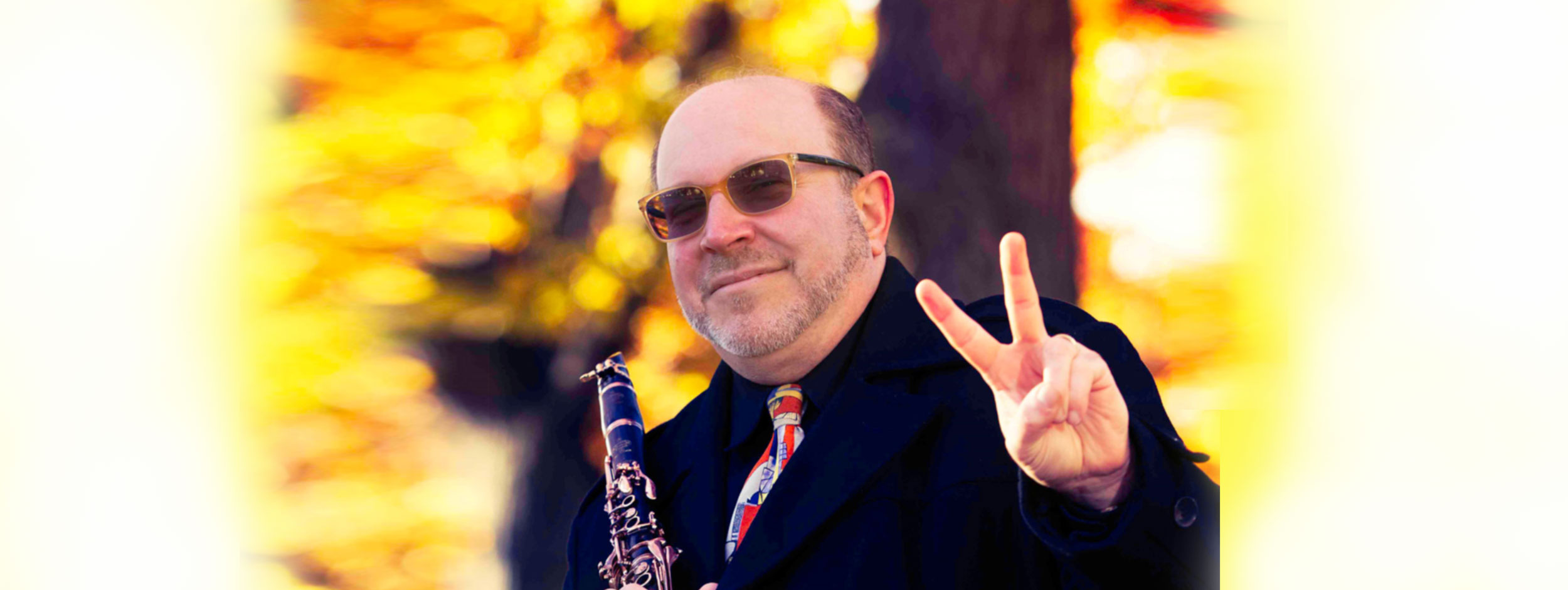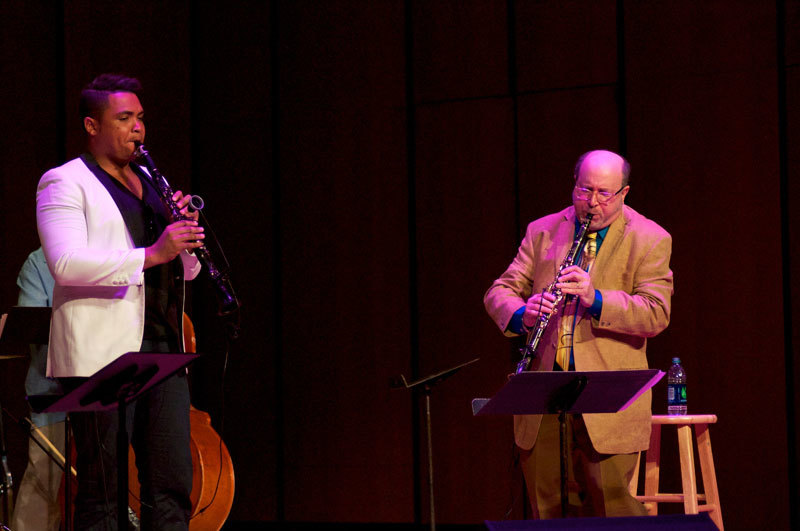Jazz Clarinet with Harry Skoler
by Jenny Maclay
Date Posted: June 20, 2016

Jazz clarinetist Harry Skoler was born in Syracuse, NY in 1956. Harry is Professor of Woodwinds at Boston's prestigious Berklee College of Music. He received his Bachelor of Music degree from Berklee in 1978, and a Master of Music degree from New England Conservatory in 1986, where he studied with legendary jazz great Jimmy Giuffre. His recordings include Conversations in the Language of Jazz, Reflections on the Art of Swing - A Tribute to Benny Goodman, A Work of Heart on Brownstone Recordings, and Two Ones on Soliloquy Records.
Jenny Maclay: The group with which you are involved, “Adventures With Jazz,” is an
educational ensemble for children. Why do you believe it is important for children to be
introduced to jazz?
Harry Skoler: Jazz is America's music, and tells a profoundly personal story of individuals through the language of improvisation. It also spans over a century of a music that speaks of the times that the jazz artists lived through. Jazz, aside from my own personal love of it, is a form of music that is paramount to education in that it is music that precisely tells the inner stories of the players with emphasis on the musician's "owning" the music; the nuance, details, and development of the music is a reflection of "musician as composer", and hence the personal connection. Children need to be introduced to experiences that allow them to personally connect and "own" the creative process. Jazz is not nearly as accessible to anyone, let alone young people, through many venues (live and others) as was in past times, so experience in the schools helps them connect with this profound music! The group "Adventures With Jazz" is not my group, but a collaboration with fellow jazz artists/educators Roger Kimball (Bass), Mark Retallack (Keyboard) and Tim Gilmore (Drums). There is no single leader with this group, and is truly a joy!
JM: Why do you think jazz education is important for all music students?
HS: I think that, in the same way that "reading" is really about "interpretation" rather than the pronunciation of the "words", jazz education emphasizes "interpretation" and "personal,
profound connection" to sound. Of course, regardless of style, written music may be part of a music student's experience. However, there are times that a student might not have reached a point where interpretation of written music is part of the process of reading. In jazz, since the study of the music includes improvisation, it becomes an experience of hearing, and hopefully, one of feeling and personalizing "sound". Then, it helps give the music student the understanding that all written music must be interpreted, not just "read". The music itself has proven to be an intimately fundamental part of our history in regard to the arts, and exposure to jazz can only expand a music student's life, not cause any restriction. We, as people, improvise throughout our day, regardless of whether we're musicians or not. How can it not be a fundamental part of a musician's education? As the legendary jazz alto saxophonist Charlie Parker said, "Anyone can play this music if they feel it". Let's give music students the opportunity to hear it, play it, and as Bird said, "feel it"!

JM: You are most known for your jazz clarinet playing. Were you classically trained, or did you always focus on jazz?
HS: I began with classical studies. After about a year, my teacher and mentor Doug Soyars
asked if I liked jazz. I had no clue as to what jazz was! I responded that I "hated jazz!” I laugh now since my response wasn't based upon anything whatsoever! In any case, my teacher gave me some Benny Goodman transcribed solos to take home and practice. I think he had a plan! He didn't ask me to listen to the music, etc. When I returned the next week and played them without a swing feel, he borrowed my clarinet, popped his mouthpiece on it, and wailed on the solo!! I was in awe, and ran off to buy and listen to my first Goodman recording. That evening I told my father that I wanted to be a jazz clarinet player. That was over 40 years ago! I continued for years to study classical, but studying and performing jazz was equal to it.
JM: How did you decide to play the clarinet?
HS: When I was about five or six, I remember seeing a clarinetist on television and being
intrigued. However, it probably would not have gone anywhere if it hasn't been for a kid in my neighborhood threatening me if I did not take clarinet lessons, since his parents were forcing him to take lessons and he wasn't going to be the "only one!" Well, rather than endure this kid's wrath, I also took lessons! It is one of the best things in my life that happened from what started as a negative experience! I am, of course, completely against bullying. Surprisingly, this terrible experience had an outcome that was profound and happy!
JM: As a clarinet professor at Berklee College of Music in Boston, what are your teaching philosophies?
HS: I believe that, whether I'm teaching clarinet or saxophone, the priority must be one of "listening"! Not only to the playing, but to what each student brings to the learning experience as an individual. If I can empathize and work as a team, then hopefully the "student" becomes more of a "teacher" to themselves, exploring and discovering details, philosophy and nuances that they will know of intimately, since they know themselves in many ways, better than anyone. If I can help them find ways to discover for themselves "epiphanies", then they will truly "own" those discoveries in their own personal way! This philosophy is inclusive, as it allows there to be structure and responsibilities from my perspective but also incorporates the student's own abilities to embrace the creative process in their own ways. As my father, Louis Skoler, a brilliant architect and professor said: "There's the "teaching", but there's the "learning!"
JM: who are your musical inspirations?
HS: My inspirations come from great mentors that I had, including my teacher early on (Doug Soyars), and Jimmy Giuffre (at New England Conservatory of Music for graduate studies), and the legendary "teacher of teachers" Joe Viola at Berklee, who brilliantly helped me discover that my clarinet could let the jazz "play itself"! He helped me tap into my sub-conscious and to relax. All of these mentors (among others) helped inspire me to keep being a "student" every day of my life!
JM: Can you please tell us about your daily practice routine?
HS: I place a great deal of emphasis on warming up. I think, at least for myself, that it takes time both physically and musically to become re-acquainted with the clarinet every day. Making certain I practice long tones with dynamics, smooth interval connection exercises and scales, etc. (slowly) helps me feel like the clarinet is as natural as my voice. I will then prioritize to include jazz vocabulary and improvisation, reading, sight reading and studies for technique. I try to move through it with focus and relaxation. I also listen to recordings and play along. I re-evaluate regularly and make certain I'm meeting goals in the "big picture".
JM: In addition to clarinet, what other hobbies do you enjoy?
HS: I'm a collector! I love many diverse areas of collecting, each with a connection or story that is part of my life. For music, collecting 78 RPM records and also rare artwork (by Miles Davis and others)... I also collect rare books and antique toys from the 50's and 60's, sports (baseball), comic books (started collecting when I was a kid), and many other collections. I'm a huge film fan and love to read! Then, of course, my true inspirations: my wife Joanne, and offspring Daniel, Amelia and Gianna!
Subscribe to the We Are Vandoren E-newsletter (WAVE) to receive 4 weekly articles for Performers, Students, and Educators